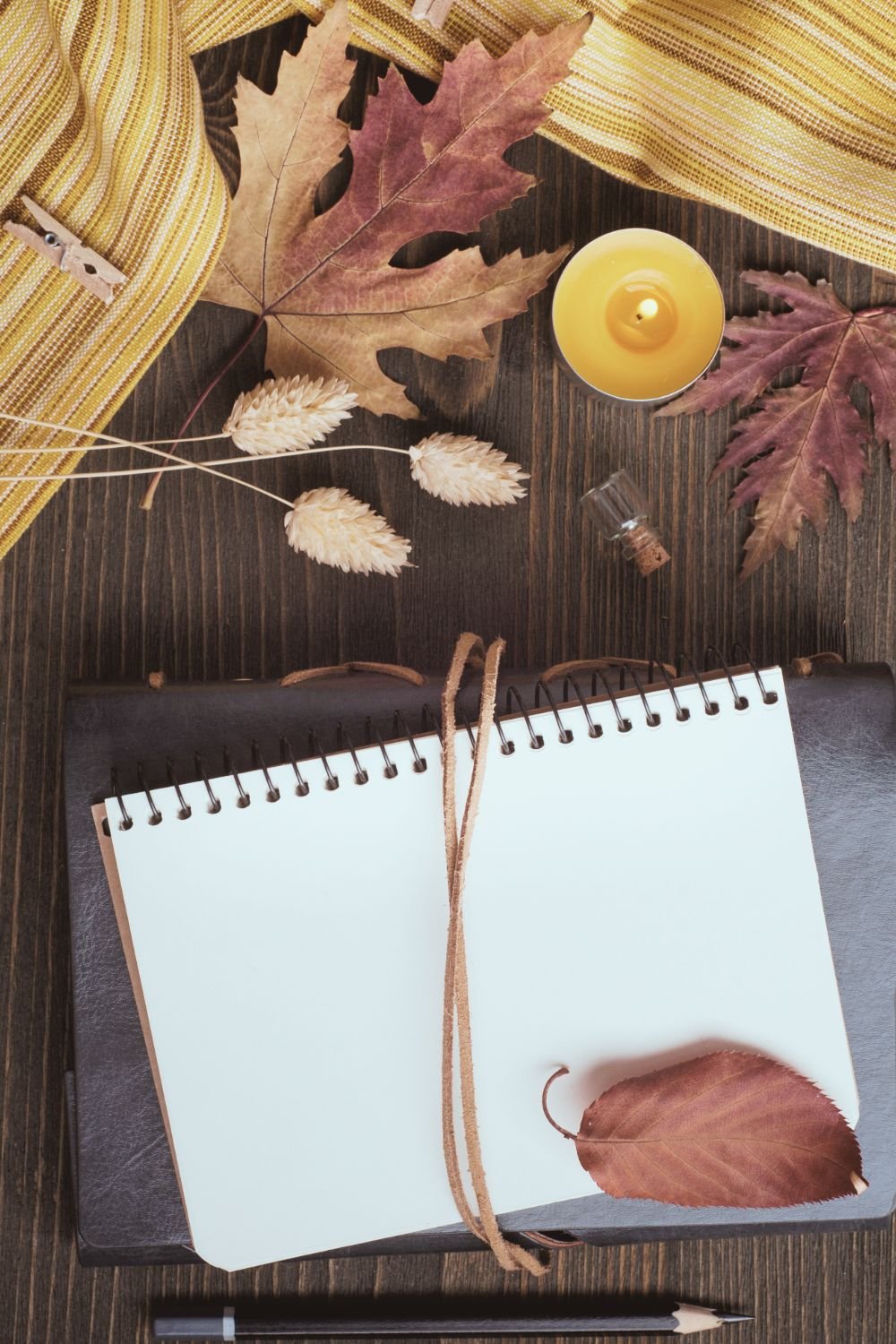Journaling | Intuition Development | Emotional Wellness
Tune In To Your Inner Voice
Access the healing powers of your inner guidance through journaling exercises, daily journal prompts, tools for building intuition, and resources for emotional wellness & emotional healing.

Nestle Up With These Journal Prompts For Fall
Autumn brings a new routine for many people, but even if your routine will stay the same, the changing of the season tends to bring a newness that invites reflection. Fall is my favorite season, it brings to mind the sound of crunching leaves underfoot and geese honking overhead, cozy sweaters, warm drinks, the smell of bonfires, and the taste of pumpkin bread. Of course, not all fall memories are sweet; it also brings to mind the dreaded fall allergies, and a few bittersweet feelings about autumns past. Whatever your feelings about fall, it can be great time to pause and reflect.
I invite you to grab your journal and reflect on the end of summer and the beginning of fall. If it feels helpful, use the journal questions below to start.

What Is Shadow Work?: How Your Shadow Self Can Free You To Live Authentically
Your shadow contains everything you don’t know about yourself, so how can you meet your shadow self?
What does “shadow self” mean?
Psychologist Carl Jung described the shadow as unconscious aspects of personality. These shadow parts of our personalities are not necessarily good or bad, they are simply parts of who we are that we aren’t aware of. The shadow self is composed of aspects of our personalities that it feels too scary to see. Our shadows are made up of parts of ourselves that we don’t think should be there for whatever reason. Our shadow selves could contain desires we don’t think we should have, emotions we don’t think we should have, and needs we don’t think we should have. The idea that these aspects of our personalities are undesirable might come from childhood, our culture, or significant experiences or relationships in our lives.

Journal Prompts for Shadow Work: Do You Judge Yourself?
What does it mean to judge yourself?
Here are some common examples of self-judgement: Going over a conversation or interaction in your head afterwards and chiding yourself for something you said or did. Berating yourself after you express an emotion or show vulnerability. Holding yourself to a standard of perfection and picking apart everything you could have done better. Being hard on yourself when you forget to do something or when you don’t know how to do something.

Surprise Yourself With These Journal Prompts for Self Discovery
How is it possible that sometimes we surprise even ourselves?
It may seem like an obvious truth that we know ourselves, and to a certain degree, this is inevitably true. After all, you’ve spent your entire life as you! Yet, we have all had life experiences - no matter how mundane those experiences may have been - that we simply don’t consciously remember. Sometimes we’re surprised by our reaction to a situation, or we forget that a particular activity makes us happy. It’s easy to lose touch with parts of ourselves or to lose ourselves in relationships, work, people pleasing, busy schedules, or simply the ebb and flow of daily living. Our relationship with ourselves is the most important relationship in our lives.

Mindfulness Prompts for Connecting With Your Body
What does it feel like when your mind and body are connected?
The way in which our minds and bodies interact with each other has a profound impact on our daily lives and our physical and emotional health. Spending some time reflecting on our mind-body connection in a big picture sense can help us to identify what’s working for us and what’s not when it comes to cultivating mindfulness in our daily lives. I invite you to explore - and journal about - your mind-body connection. If it feels helpful, use the journal questions below to start.

Journal Prompts for Connecting With Your Intuition
How do you know when you’re connecting with your intuition?
Intuition is knowledge that comes from our bodies. Intuitive knowing is different than the knowing that comes from intellectual, logical, step-by-step processing. Both types of knowing are important for our daily lives, but intuition is a type of knowledge commonly denigrated in modern culture and therefore more easily dismissed as untrustworthy or unimportant. Disregarding our intuition prevents us from accessing important information and a deeply meaningful aspect of what it means to be human. Moreover, intuitive ways of knowing exist within each of us even if we dismiss or disregard this type of knowing; by being aware of the role of intuition in our lives we can learn to harness this way of knowing to assist us in our daily lives and we can avoid being unconsciously driven by intuitive forces that we have no conscious means of conversing and interacting with.

Reflect On Your Relationships With These Journal Prompts for Relationships
How do your relationships impact your life?
Our relationships with friends, family, co-workers, and significant others have a profound impact on our lives. Despite the power of relationships in our lives, we may not commonly take the time to reflect on how our friendships, acquaintances, and other relationships impact us and how we impact those in our lives. I invite you to take a relationship inventory by reflecting on, and journaling about, the relationships in your life.
If it feels helpful, use the journal questions below to start.
Write down the names of 3-5 people you are around on a regular basis, or the names of 3-5 people who have the greatest impact on your life right now. For each person, answer the questions below.

Journal Prompts For Finding The Divine Feminine In You
What does it mean to be feminine? Everyone, regardless of their gender, contains aspects of personality and being that encompass what we traditionally think of as feminine. And, regardless of our gender, these aspects of ourselves can be undervalued due to our life experiences, including living in a society that undervalues activities and ways of being that have been historically and culturally associated with femininity. Yet, none of us can truly feel and be whole without acknowledging and accessing our personality in full, including aspects of our personality that may fall within this traditionally feminine sphere. I invite you to explore your conception of femininity and how you interact with the feminine in the world and within yourself.
If it feels helpful, use the journal questions below to start.

What I Wish I Knew Earlier About Healing Psychological Trauma
Your body intuitively knows how to provide you with deep emotional healing & your body wants to heal you.
I’ve read a lot of things about the process of emotional healing and healing psychological trauma that I agree with and that make sense to me. But I also know that these ideas resonated with me earlier in my life at a time when I was deeply confused about how to go about the process of healing psychological trauma and desperate to get it underway. None of the things I read actually told me anything I could connect with about how to emotionally heal or what it looked like. A lot of what I read felt more like a simultaneous truth and platitude to me.

Shadow Work Prompts For Childhood Trauma
What were you not allowed to talk about when you were growing up?
Families, like other social groups, have rules. Many of these rules are unwritten. Some of these unwritten rules tell us what we’re allowed to talk about and what we’re not allowed to talk about. If the family you grew up in was dysfunctional in some ways, there may have been many topics that couldn’t be discussed. Without self-reflection, we can unknowingly carry these same rules into our future friendships, romantic relationships, and our new families. Perhaps most detrimentally, we can also carry these rules into our relationship with ourselves.

Reflect On The Health Of Your Dating Life With These Journal Prompts for Dating
What version of yourself would you be in a romantic relationship that felt safe and nourishing to your soul?
In reflecting on what we want in an ideal partner, it’s easy to focus on traits or characteristics that are simple to describe and identify - the kind of information you can glean from a quick glance at a Tinder or Hinge profile, or a few messages or dates. But, the attributes and conditions that make a relationship feel good are actually much harder to describe. Sometimes we call this difficult to describe feeling chemistry. But can we - at least to some degree - learn to understand what gives us that sparks flying feeling?

Shadow Work Journal Prompts For Taking A Memory Inventory
What do you remember, and what don’t you remember?
While we commonly recall past experiences, it’s less common to consciously reflect on what we do and don’t remember from earlier times in our life. These journal prompts encourage you to take a step back and look at your memories with a big picture view.
I invite you to grab your journal and write about times in your life you remember clearly and moments and eras you have few or no memories from. If it feels helpful, use the journal questions below to start.

Journal Prompts for Shadow Work: What Do Your Pet Peeves Say About You?
What can your pet peeves tell you about your shadow self?
Everyone feels annoyed sometimes. Maybe it’s loud chewing, slow walking, or showing up late, whatever your pet peeves are, they have a story to tell about your past and how you experience life. They even have a story to tell you about your shadow self.
Shadow work is all about making aspects of ourselves that are unconscious, conscious, or in other words, bringing these aspects of ourselves out of the shadows and into the light. This is how we meet our shadow self and integrate our shadow self. When something is unconscious, however, that inherently means that it’s difficult for us to see. Exploring how we interact with others, or in other words, understanding that others are our mirror, can help us to bring our shadow selves into the light.

Tips For Describing Dreams In Your Dream Journal To Enhance Your Dream Interpretations
Dreams don’t always follow the logic of everyday life.
When describing a dream in your dream journal it’s a natural impulse to write about the dream the way you would tell a story to a friend, following a linear narrative and logical conventions. For some dreams, this “logical” style of writing can cause you to inadvertently leave out important information in your dream diary. Here are a few tips for describing dreams in your dream journal to maximize the information that you have available for dreamwork, dream interpretation, and dream analysis.

5 Types Of Journals To Keep To Get In Touch With Your Inner Guidance
Intuition is the ability to connect with the knowledge of your body.
As Nietzsche said, “There is more wisdom in your body than in your deepest philosophy.” But, you don’t have to take a philosopher’s word for it. Scientific research backs this up. Malcolm Gladwell discusses this concept in his book, Blink. He describes an experiment in which participants have two decks of blue cards and two decks of red cards. Each card gives the participant money or takes money away. Choosing a red card sometimes awards a high dollar amount, but usually results in a large loss. In contrast, the blue cards rarely lose money and usually award a small amount of money. Before the participants became consciously aware and able to describe the pattern, their bodies began to respond to the pattern

How To Keep A Dream Journal
Life can be difficult. Life can be busy. Feeling disconnected from yourself – from your intuition, your voice, your desires – is a common result. Dream journaling is probably not the first antidote that comes to mind. But, dream journaling has incredible power to help you reconnect with yourself.
Encoded in dream symbolism, our dreams have messages for us, from us.

Journal Prompts For Finding The Sacred In The Everyday
What is the difference between the mundane and the sacred?
Attention. Attention elevates everyday mundanity to the realm of the sacred. Routine tasks are – almost by definition – tasks we don’t pay close attention to. Choosing to religiously focus our attention on some of these tasks throughout the day creates a liturgy of living that reconnects us with ourselves and the world.
Applying lotion is a routine daily task. Attention transforms this routine into the sacred: putting on lotion slowly, noticing the body part you’re applying lotion to, noticing how the lotion feels on your skin, and reminding yourself “this is my body.”
Quickly shampooing your hair and washing your face before you jump out of the shower is an everyday task.

How To Connect With Your Intuition Through Blackout Poetry
Directions for blackout poetry creation!
Disconnection from yourself can create a feeling of meaninglessness and discontent. But ironically, the pressure to connect with your inner voice can create noise that prevents you from hearing yourself. Blackout poetry puts the focus on creating a piece of art and takes away the noise. Creating blackout poetry is a fun exercise for developing your intuition.
You don’t need to be a writer, a poet, or an artist to create blackout poetry. You don’t even need to know anything about poetry. If you’ve heard of found poetry, erasure poetry, redacted poetry, or altered book poetry, blackout poetry is pretty much the same thing.


